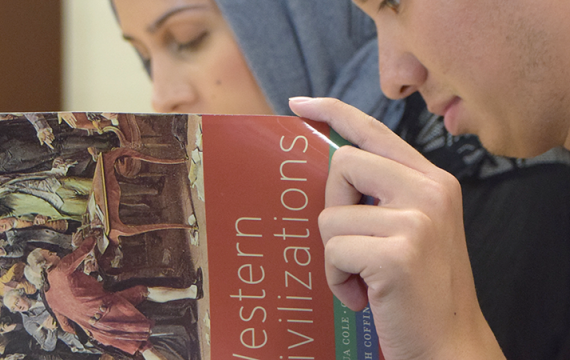History

History
History is the study of human experience from the dawn of time to the present. It examines people, institutions, ideas and events of the past and the present. The primary objectives of the History program are: fulfillment of general education requirements for American Institutions, Humanities and Social Sciences; completion of the Associate of Arts degree; and preparation for transfer to four-year institutions and completion of general education requirements for students enrolled in four-year institutions.
The courses in this program emphasize a number of Program Learning Outcomes, primary being the development of critical thinking and communications skills to analyze problems, conceptualize theses, develop arguments, weigh evidence and derive conclusions; development of the ability to articulate the critical thinking outcomes through writing and/or speaking or by other modes of communication; and the development of an awareness of civic responsibilities and a thorough knowledge of global issues.
Program Learning Outcomes
Students who complete the History program will be able to:
- Demonstrate knowledge of key historical facts, values, and ideas that have shaped civilizations throughout history.
- Critically analyze primary and secondary sources in college-level essays, written assignments, and research papers.
- Demonstrate historical skills through written and verbal communication of arguments, analysis and conclusions of historical topics.
This program’s Academic & Career Pathways:
Careers in this field
- An undergraduate degree in history is good preparation for graduate study in history, as well as other areas such as, law, public administration, or business. Research the prerequisites for the degree of interest and tailor program of study to meet curricular requirements.
- Obtain leadership roles in school or community organizations. Get involved in student government, mock trial, debate team, or Model United Nations.
- A major in history provides a broad, liberal arts education. Develop a career goal, and then obtain the skills, experiences, and education necessary to enter that field.
- Gain experience in fundraising and grant writing techniques. Nonprofit and educational organizations are often funded in this manner.
University Majors & Degrees (History Related)
- History
- Liberal Studies
- Social and Behavioral Sciences
- International Studies
- Africana Studies
- Chicana/Chicano Studies
- Administrative Studies
- Renaissance Studies
Students who plan to transfer to a four-year college or university in this discipline should consult with a counselor or visit the Transfer Center to determine the appropriate major preparation courses for their specific transfer institution and major. More information on transfer programs and procedures is available in the Transfer Guide section of the catalog.
Careers Relating to History Majors
- Local and State Government
- Federal Government
- Politics
- Law
- Nonprofit
- Information Science/Curatorial and Archival
- Management
- Education
- Business
- Media
Most careers in history require education beyond the associate degree and some require a graduate degree. This is not a comprehensive list but some of the most common career options with history preparation.
Transfer Options in History
Common university majors in this field include:
- History
- Liberal Studies
- Social and Behavioral Sciences
- International Studies
- Africana Studies
- Chicana/Chicano Studies
- Administrative Studies
- Renaissance Studies
Students who plan to transfer to a four-year college or university in this discipline should consult with a counselor or visit the Transfer Center to determine the appropriate major preparation courses for their specific transfer institution and major. More information on transfer programs and procedures is available in the Transfer Guide section of the catalog.
Most careers in history require education beyond the associate degree and some require a graduate degree. This is not a comprehensive list but some of the most common career options with history preparation include: archivist, business person, diplomatic corps, historian, journalist, lawyer, librarian, museum curator, park historian, professor, teacher and writer.